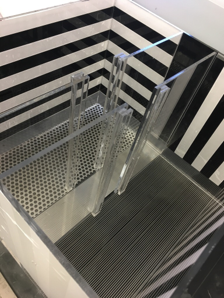 Meet Isabel Bravo, a Junior double-majoring in Neuroscience and Biology, with minors in Chemistry and Medicine, Literature, and Culture. She works in the McElligott Lab under the instruction of Dr. Zoe McElligott. The McElligott Lab is located in the Bowles Center for Alcohol Studies at UNC and explores the neural circuits and mechanisms regulating physiological and pathological affective behaviors.
Meet Isabel Bravo, a Junior double-majoring in Neuroscience and Biology, with minors in Chemistry and Medicine, Literature, and Culture. She works in the McElligott Lab under the instruction of Dr. Zoe McElligott. The McElligott Lab is located in the Bowles Center for Alcohol Studies at UNC and explores the neural circuits and mechanisms regulating physiological and pathological affective behaviors.
Tell us about your research. My research focuses on the behavioral adaptations in acute and protracted opioid withdrawal. Recently, I have begun to study the effects of oxytocin on anxiety-like behaviors and dysregulation of sleep during and after opioid withdrawal.
What is the most valuable lesson you’ve learned from this experience? The most valuable lesson I have learned from my research is the importance of failure. My first two independent study projects did not work and I was terribly discouraged. However, I wrote about and presented my projects and learned that failure is a big part of science and received lots of great feedback on how to improve the projects. I’ve also learned how to tell when it’s time to let a project go and move on even though I can be very stubborn.
What has been the most difficult part of your research experience? The most difficult part of research for me has been learning how to balance my time in lab with my other commitments like class, training on the fencing team, and volunteering in the hospital. I have learned how to schedule experiments to fit around my commitments, often using the weekends, holidays, and early mornings. I am also practicing saying no to experiments that conflict or overload my schedule. It is hard to find a balance, but I believe that defining my boundaries is a skill that will be important throughout my career.
 Do you get to work with any interesting equipment? Yes! One of my favorite pieces of equipment that I work with in the lab is called a condition place preference chamber. It has 2 distinct rooms, each with a different kind of floor and wall pattern. We use these chambers to condition the mice to associate one side with a stimulus like alcohol or morphine, and then test their preference for the stimulus based on how long the spend in each side. I made a set of 8 of these my freshman year using tools and materials from the Makerspaces and Physics Instrument Shop, and got to use them in an experiment this past year!
Do you get to work with any interesting equipment? Yes! One of my favorite pieces of equipment that I work with in the lab is called a condition place preference chamber. It has 2 distinct rooms, each with a different kind of floor and wall pattern. We use these chambers to condition the mice to associate one side with a stimulus like alcohol or morphine, and then test their preference for the stimulus based on how long the spend in each side. I made a set of 8 of these my freshman year using tools and materials from the Makerspaces and Physics Instrument Shop, and got to use them in an experiment this past year!
Our Undergraduate Research Series features spotlights on our Psychology and Neuroscience majors and minors who are conducting undergraduate research with our faculty! We believe strongly that undergraduate experiences are greatly enriched by inquiry and discovery through undergraduate research. Research experiences allow students to better understand literature, determine areas of interest, discover their passion for research, continue on to graduate studies, and to jump start their careers as researchers. If you are an undergraduate who is interested in pursuing research experiences, we offer PSYC and NSCI 395 as an opportunity to work side-by-side with graduate students and faculty members on cutting-edge psychological and neuroscience research. We also recommend you visit the Office for Undergraduate Research to find research opportunities, apply for research funding, and for helpful tools and advice. Research opportunities abound at UNC – find one that works for you!

